What Was Your First Social Network?
It’s easy to forget that social media is a very recent addition to our lives. My father didn’t ever own, or know how to use a PC, let alone be a member of a web-based social network. My children have barely known life without an online social life. Do you remember life before social media? Did you see Facebook’s current challenges coming?
Little more than a decade into this Internet-inspired social experiment and a certain amount of introspection is going on. The heady days of promiscuous connection look like they’re over, as we think more about privacy and security than wanton sharing of our lives and data.
But where did it begin for you and what happened to those early pioneer platforms who first captured our attention and our, ultimately trade-able, personal information? Did you start with Friends Reunited? Or was it MySpace that got you sharing your life online? Maybe it was a specialist Ning-based network that you joined or a niche or professional cyber-clique? When was the last time you looked at your profile there? What happened to them as Facebook and Twitter began to dominate?
In the process of reviewing alternatives to Facebook and looking at the future of social media, I’m pausing to look back. If Facebook is the daddy right now, albeit struggling to offer a decent parental role model, who are the grandparents?
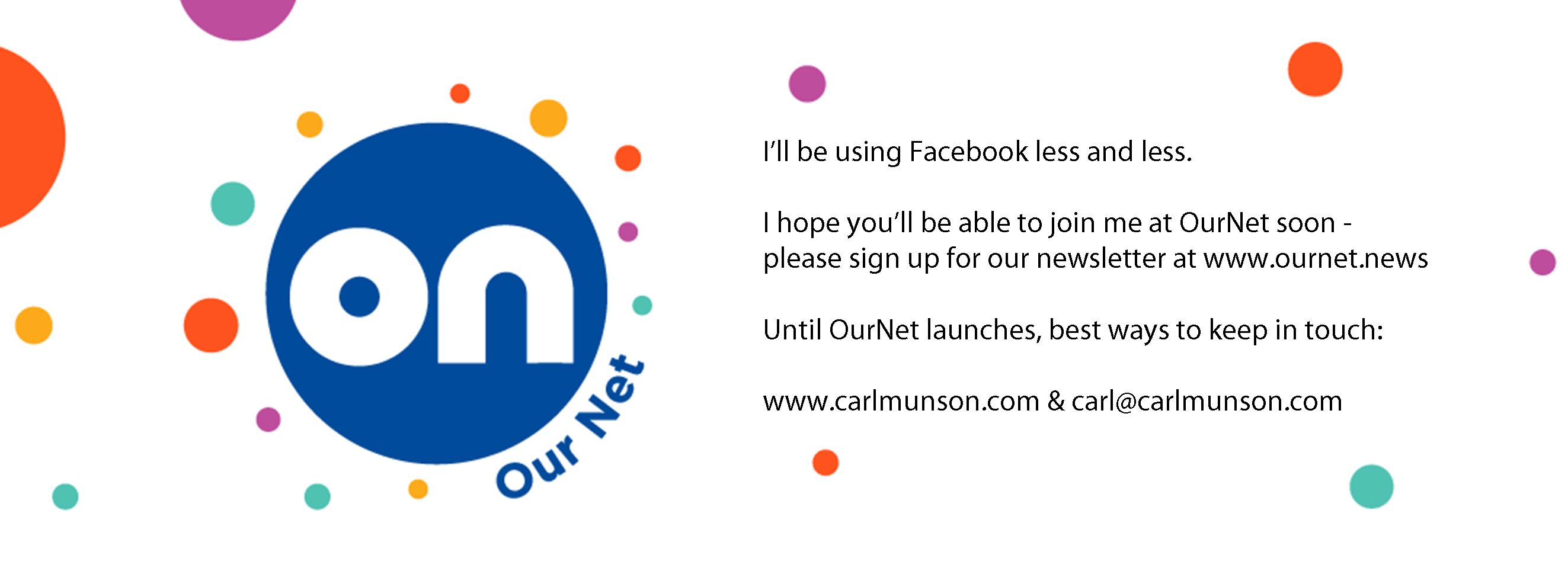
I asked the question - What Was Your First Social Network? - of my rapidly diminishing Facebook friends this morning (now down to around 1,200 from 1,800-ish earlier this week) and the consensus implicates MySpace, Friends Reunited, and Bebo as the most popular starter cultures.
Wags and clever-dicks spoke variously of The Scouts, 'ham radio', pen pals, the Rolodex and their little address book as social networks, which in a way they are, but not for the purposes of this research. That's Facebook for you, isn't it, people 'trying out material' (-:
Shout-outs came in for more obscure networks like '360 degrees', apparently a blogging network and social space from "20 odd years ago ... still have friends that migrated with me now" and 'The Well' - "before the web happened".
Friend and social network creator himself (www.holisticlocal.co.uk and regional variants), Andy Metcalfe, helped frame the inquisition, defining social networks as "what we're used to now, i.e. you create a free profile and can connect to other people who have similar interests or whatever, and send private messages." He also name-checked 'Friendster' - "generally considered the first" - launched in 2002, yet according to Google: "wasn't the very first social network, but it was the first to break into the mainstream. At its peak it had tens of millions of users."
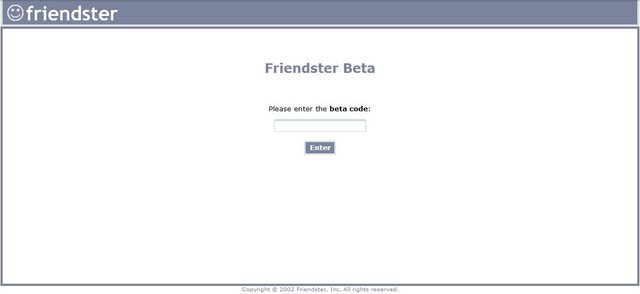
A couple of other friends referred to now-defunct 'MSN', presumably messenger, which many remember fondly as a very early form of online chat, but not strictly speaking a network.
The Grandparents of Social Media?
So let's take a look at the dominators of the straw poll - MySpace, Friends Reunited and Bebo - and join me, as I take a look down social media’s memory lane and check in on the past, to see how the founding DNA fared and what it's chances might be as it mutates for the generations and iterations that will be Web3.0...
Friends Reunited
If talk of this vintage site has inspired you to return to the scene of any earlier crimes of stalking or passion, don’t bother with early offering Friends Reunited, as it’s shut!
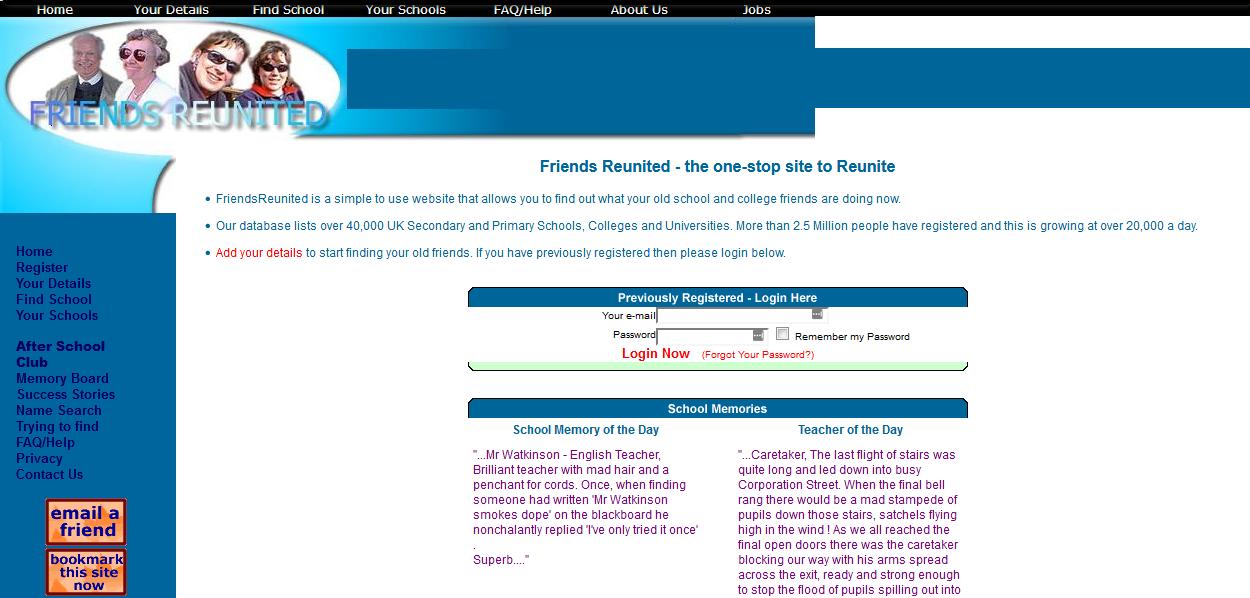
[Friends Reunited, back in the day (2002), thanks to Wayback Machine]
According to wonderful Wikipedia: “Friends Reunited was a portfolio of social networking websites based upon the themes of reunion with research, dating and job-hunting. The first and eponymous website was created by a husband and wife team in the classic back bedroom internet start-up; it was the first online social network to achieve prominence in Britain, and it weathered the dotcom bust.”
Launched on the 30th June, 2000, it was home to 23.8 million users by 2010. Formerly, the site cost £7.50 per year to use but was later free of charge, and worked on the principle of user-generated content through which registered users were able to post information about themselves which could be searched by other users.
It spawned a sister site, the understandably, but slightly disturbingly-named 'Genes Reunited', which enabled members to pool their family trees and identify common ancestors, as well as dating and jobs spin-offs too.
The ITV network at some stage owned the site and sold it to DC Thomson's Brightsolid subsidiary in 2009 who relaunched Friends Reunited in March 2012 with a new emphasis on nostalgia and memories. It shut down as of 26th February, 2016.
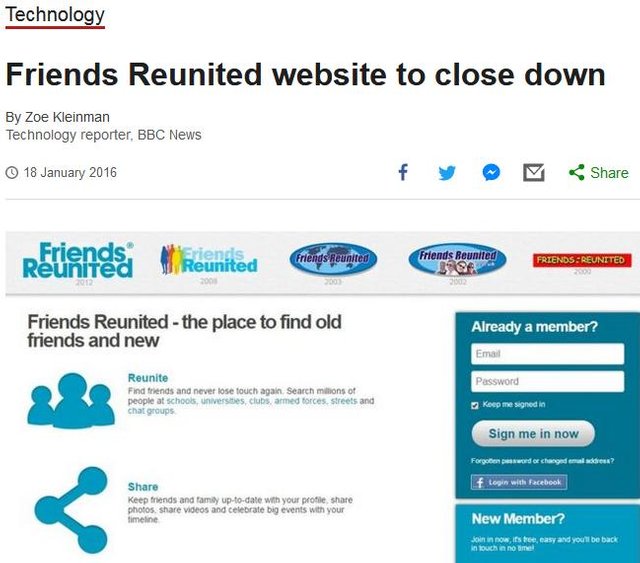
[Goodbye old friends!]
Myspace
The wikipedia has Myspace down as "a social networking website offering an interactive, user-submitted network of friends, personal profiles, blogs, groups, photos, music, and videos".
Acquired by News Corporation in July 2005 for $580 million, Myspace was the largest social networking site in the world from 2004-9 and even surpassed Google as the most visited website in the United States during 2006.
How the mighty fall though, as April 2008, it was overtaken by Facebook in the number of unique worldwide visitors. even though it still manage to generate $800 million in that same year. Ever since then, Myspace has declined steadily despite revamps, as its attractions have been out-done by newcomers eager to impress and dominate.
Justin Timberlake previously owned a stake in Myspace, now owned by Time Inc. This year, Myspace was ranked 4,153rd in total Web traffic, a significant comedown and perhaps warning to Facebook? It's worth noting however that it still has a pool of nearly 1 billion active and inactive registered users, including me...
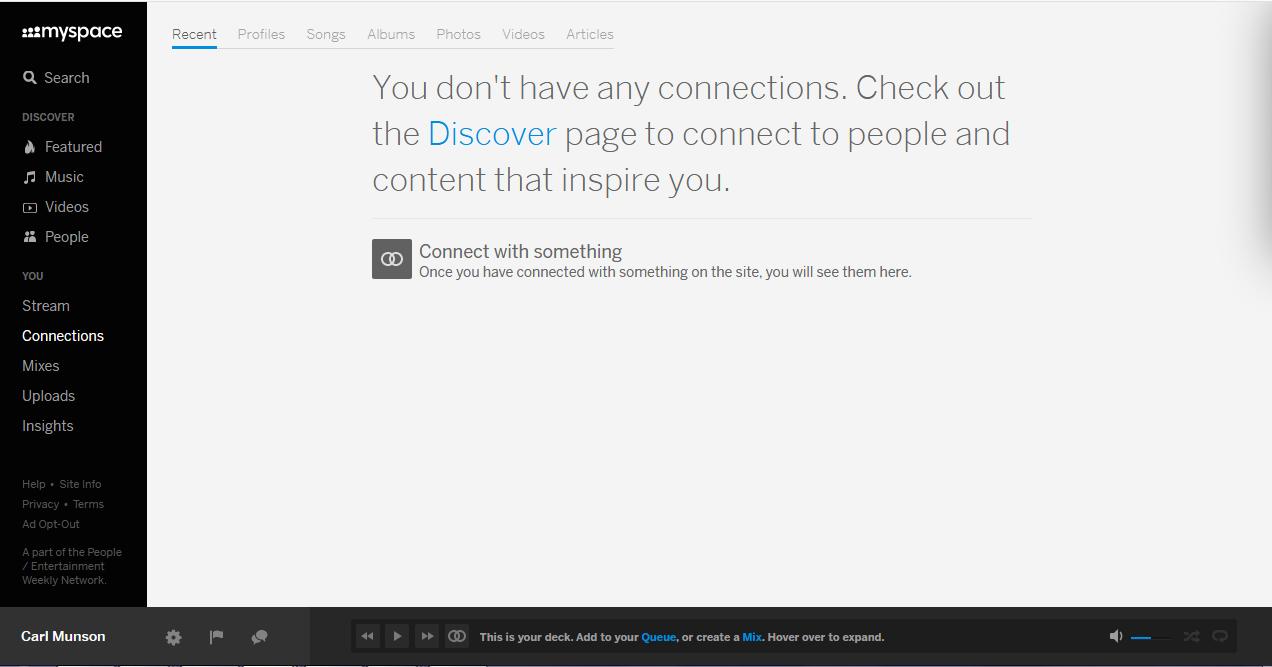
[Turn your back on Myspace for 10 years and look what happens; nice of them to remember me at all though]
In this last, watershed week for social media, Florida Today's 'BDB' column asserts, somewhat tongue-in-cheek "OK Myspace, now's your big chance for a comeback" - https://www.floridatoday.com/story/news/2018/03/26/bdb-ok-myspace-nows-your-big-chance-comeback/459048002/
This is something of an open letter to 'Myspace Tom'. Remember him? No, not many of us do!
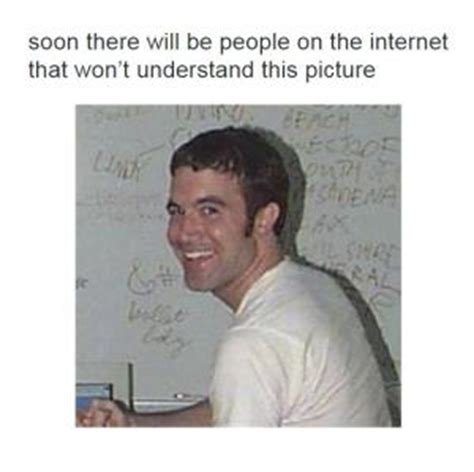
Bebo
With further grateful thanks to wikipedia, I can tell you that Bebo is another husband and wife-inspired early entry, launched in 2005. And like the other Mr & Mrs platform, Friends Reunited, is also as good as shut.
Now describing itself as "a company that dreams up ideas for fun social apps", Grant Denholm, the man behind Bebo's fairly recent relaunch, confirmed that the site will not be returning as a social network but as a company that makes social apps, an example of which 'Blab', launched in early 2014, closing in 2016.
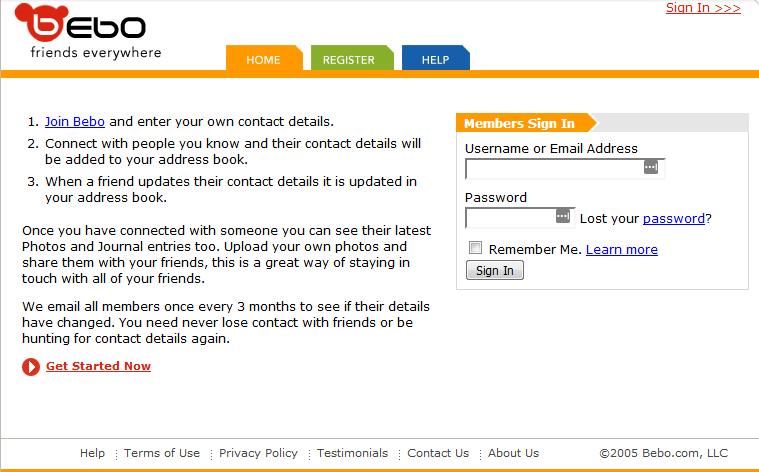
[Bebo as it used to be(bo) in 2005]
This site, once the darling of kids, certainly in the UK, was created by Michael and Xochi Birch, who created the 'backronym' (worth looking up) "Blog Early, Blog Often", which they invented to answer the question about what the name meant.
At the height of its popularity, Bebo overtook Myspace to become the most widely used social networking website in the UK, eventually registering at least 10.7 million unique users. Its popularity saw it sold to AOL for $850 million in 2008, yielding the Birches a profit of $595 million from the deal.
The BBC later described the AOL purchase of Bebo as "one of the worst deals ever made in the dotcom era", costing then-CEO of AOL, Randy Falco, his job.
On April 7, 2010, AOL announced that it would either sell the website or shut it down, due to the falling numbers of users who were moving to rival site Facebook. AOL said that Bebo could not compete with other social networking sites in its current state, and that the company could not commit to taking on the massive task to keep Bebo in the social network 'race'.
In the A-Z of social networks, looks like it was only ever going to to be A to Bebo.
What you'll see these days is this strange, distant relative...
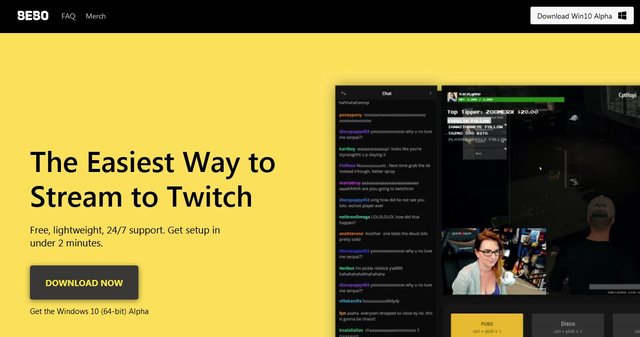
Incidentally, you can buy the www.bebo.com domain for $8,000. Or at least that's what one pop-up ad told me during my research.
Money Munson's Verdict
I hope, like me, you've found this trip down social media memory lane fascinating, and perhaps sobering. How clearly the mighty fall, how clearly we are all so fickle.
Centralised ownership is apparently a pre-requisite of such 'sh1t or bust' scenarios, where millions of users can become disinterested or ultimately (virtual) homeless, as tiny leadership teams, no doubt pressured by financiers, make exponentially-devastating decisions. Such power, held in the hands of a ruling minority, affects the majority it claims to serve, in an increasingly familiar story. A story not limited to Internet companies, but told over and over in finance, politics and the media.
The benefits of decentralisation look attractive against the post-Myspace, post-Bebo and post-Friends Reunited wasteland backdrop, yet are still hard to see in the current drop of social media giants. Now that the Blockchain is here, and we can draw on the wisdom of the grand-parent generation, perhaps we will see the power balance shift from 'them' to 'us'. Especially given the state of shock caused by centralised corporations who look like they can't be trusted with our stuff.
And as for my other preoccupation, namely us getting paid for our contributions and content, we clearly had no idea we were the network in those early days. In our naivety, we thanked the paternalistic platform creators as our liberators and enablers, and even paid them! Fair enough, it looked like a service was being offered that should be paid for. However, as canny entrepreneurs like Zuckerberg came along, they realised that people would add more and more personal content, thereby growing the site and self-generating the traffic, plus the big data advertisers and marketers would come to drool over.
This too, the fact that we are the product, is a dawning realisation. If it's our data that making the site, and our contributions that are causing the traffic, shouldn't it be US that gets a fair share of the revenue?
On both centralisation and reward, we'll wait and see. I'm hopeful. This is a fast-moving space where ideas are abundant and rapidly developed. The Internet is ours. It's our net, if you like (-;